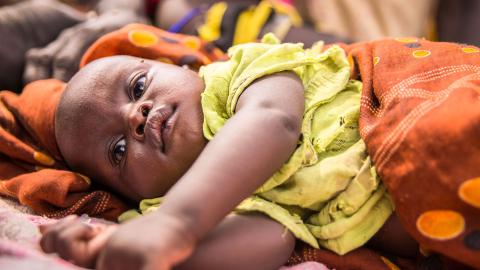
Learn more about the Global Day of Prayer to End Famine
Why do we need to Pray to End Famine?
More people face famine today than any time in modern history. Famine has been declared in areas of South Sudan, with Somalia, Nigeria, and Yemen on the brink of famine. More than 20 million people are at risk of starvation in these four countries alone. Globally, millions more suffer from drought and food shortages. In one year alone, the number of people requiring urgent lifesaving food support has jumped 35% to 108 million. In this desperate situation, children suffer most and become increasingly vulnerable. The UN is calling this the largest humanitarian crisis since 1945, the end of World War II.
There is great danger that on its current course, the global response to this crisis will be hugely inadequate and will lead to unimaginable suffering and death, which is eminently avoidable. We believe churches have a prophetic voice in calling its members, wider society, and governments to make a difference during this unprecedented period of suffering.
What’s causing the famines?
Famines are much more than a simple lack of food. They are the result of conflict, drought, poverty and global inaction, and in most cases they are preventable. Conflict is the common denominator across all four countries currently facing famine. Children caught up in conflict and famine face higher risk of violence, early marriage, exploitation and domestic abuse because of the stresses on communities and families. There is no peace without food security … and no food security without peace.
Who is behind the call to prayer?
The Global Day of Prayer to End Famine is a faith-based response to the current hunger crisis. At the invitation of the World Council of Churches, a fellowship of 348 member churches in more than 110 countries, together representing over 560 million Christians, and the All Africa Council of Churches, the Global Day of Prayer brings together a wide range of church networks and traditions, ecumenical partners and faith-based organizations to join in prayers, to overcome hunger and famine.
See a full list of partners supporting the day of prayer here.
What should we be praying for?
Food is more than a human right; it is a divine gift that must not be impeded. Hunger crises are preventable, if we reflect, act, and move together. We are joining together to pray for justice and peace, for an end to the violence that hurts both current and future generations, for the children and families in immediate need, and for those who make sacrifices while responding to the crisis. Go here to download free prayer resources and to be notified as resources become available.
Why is 21 May a critical date?
The window to deliver life-saving assistance is closing. In 2011, conflict created extreme food shortages in Somalia and more than 260,000 people lost their lives - half died before famine was declared and the full scale of tragedy was not known for years. We cannot wait until famines are officially declared - action must be taken now in South Sudan, Somalia, Nigeria and Yemen.
Five days after the Global Day of Prayer to End Famine, world leaders will meet at the G7 Summit in Italy on 26-27 May. Currently, only 26% of the required funding has been committed globally. The G7 is an opportunity for governments and world leaders to do their part. Pray for the world to take action and that the Global Day of Prayer to End Famine creates an opportunity for churches to be a light in the darkness and a voice in the silence.
Encourage your faith community to join in prayer. Go here to download free prayer resources.